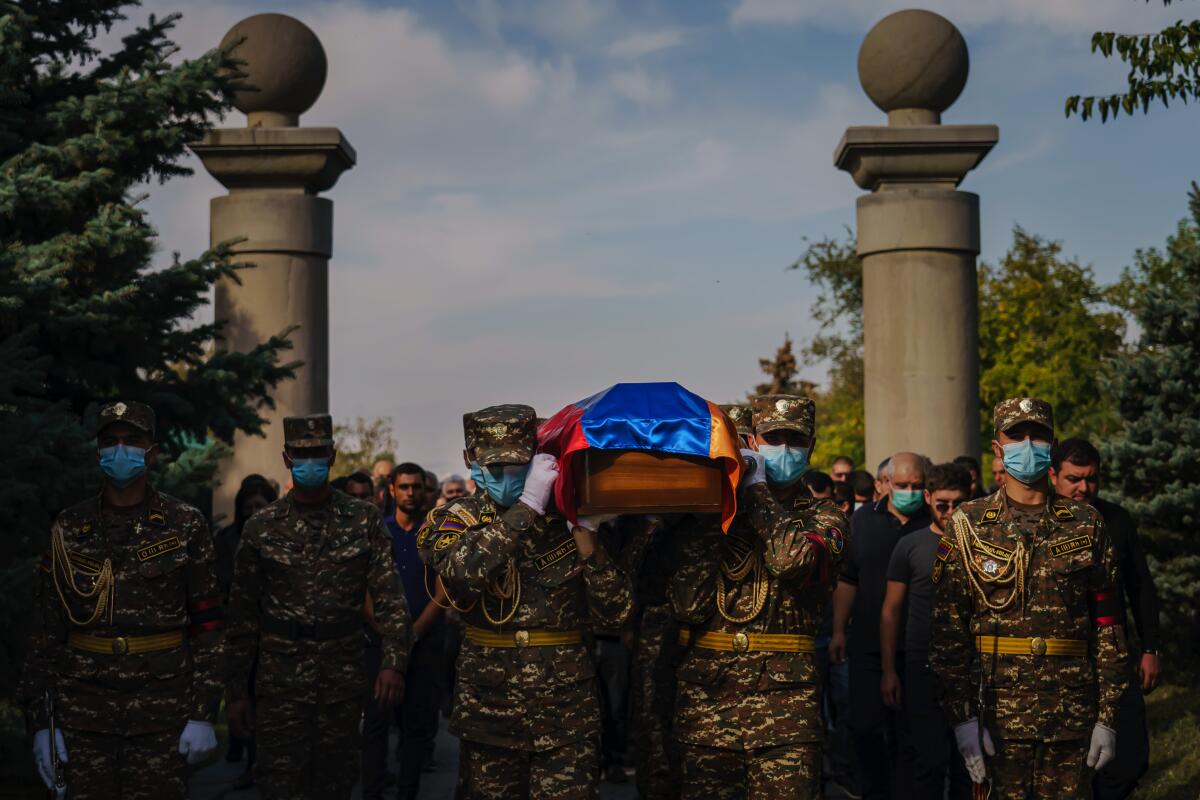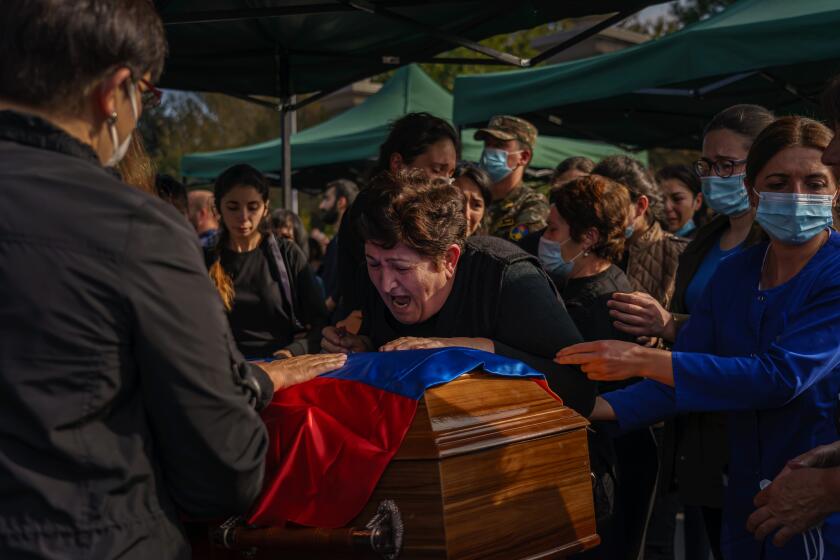Op-Ed: Remember Artsakh but never forget the Armenian genocide

- Share via
Twenty years ago, I wrote a piece for this newspaper with a three-word opening, It’s one of the paragraphs I’m proudest of in my journalism career. The entire lead was this: “The Armenian genocide.”
That was it. The whole shebang. Not an “alleged,” not a “What Armenians call a genocide,” not anything other than a statement of what was, is and always will be — the attempt during World War I to wipe Armenians off the face of the Earth.
All the usual emotions that accompany April 24, Armenian Genocide Remembrance Day — anger, sadness, frustration, isolation, honor and more — will be on display Saturday, but this year in an intensified fashion.
Remembering the 1.5 million dead and the survivors from the first genocide of the 20th century is always painful, but the marchers will also be honoring the dead and the displaced from a war that ended less than six months ago.
Armenians were defeated, and thousands died last fall, in Artsakh, also known as the autonomous region of Nagorno-Karabakh, an enclave of ethnic Armenians that Stalin plunked down inside Azerbaijan in the 1920s. Since the breakup of the Soviet Union, Azerbaijanis and Armenians have gone at each other. In the 1990s, Armenians led by Visalia-born Monte Melkonian took control of Artsakh. In September, Azerbaijan regained much of the territory, including the key city Azerbaijanis call Shusha and Armenians call Shushi.
Even through COVID masks, I suspect the chants on Saturday will be the most anguished I’ve heard since I started marching down Sunset Boulevard every April 24 with my Grandpa Nahabed in the early 1970s.
Their decades-old battle over the mountainous territory of Nagorno-Karabakh has come to define how Armenians and Azerbaijanis view themselves.
All those other marches had a single villain: Turkey, especially the Turks who commanded and committed genocide as the Ottoman Empire broke up but also modern Turkey’s leaders, who have perpetuated the lie that the genocide never occurred.
Now Azerbaijan and more will be added to the enemies’ list. Israel, for example, and its weapons manufacturers whose “suicide” drones proved a crucial factor in the defeat in Artsakh.
I reported on the war in October for the Armenian online news channel CivilNet, and every soldier I spoke with expressed terror at trying to counter the drone attacks with a Kalashnikov. Haaretz, Israel’s oldest newspaper and traditionally liberal, denounced the arms sales in op-ed articles.
The marchers on Saturday may also turn on the Republic of Armenia itself. Much of the blame for what was lost in Artsakh has fallen on Nikol Pashinyan, Armenia’s prime minister. Some say he didn’t fully deploy his country’s armed forces, holding back as a hedge against escalating hostilities that might have
given Turkey an excuse to enter the conflict overtly, rather than simply coaching the Azerbaijanis from the sidelines.
I understand — and feel — all the anger generated by the defeat: With the loss of territory comes the threat of more provocation and aggression in the region. An emboldened Azerbaijan (11 million people) supported by Turkey (85 million people) is acting like it conquered Genghis Khan’s hordes, when in reality its drones and cluster bombs outgunned soldiers from Artsakh (150,000 people) and volunteers from Armenia (3 million) armed primarily with automatic rifles.
Artsakh ripped open the wound of the genocide, but I hope it doesn’t overwhelm the day set aside to mark the event itself.
The primary point of April 24 should be what it always has been: to keep alive the memory of the victims and survivors of the genocide, to memorialize the anguish of entire towns and villages destroyed, to mark the onset of a tragic, forced diaspora.
What motivated Grandpa Nahabed to march — the indelible terror, the never-ending repercussions of systematic mass murder — is more than sufficient to do the same for Armenians today, from Yerevan, Armenia’s capital, to Glendale; Beirut to Stepanakert, Artsakh’s capital; Marseilles to Little Armenia in East Hollywood. No matter how we feel about Azerbaijan, Pashinyan’s decisions and the rivalry of great and not-so-great powers in the South Caucasus, the meaning of April 24 should not be diluted.
Remember Artsakh, but never forget what started 106 years ago. In 1915 the outside world barely noticed when the killing began. U.S. presidents have bowed to Turkey and refused to acknowledge it as “genocide,” though President Biden hopefully will change that. We can’t allow what happened to be replaced by other outrages. Let the defeat of Artsakh underline the anger and grief of April 24, but do not let it overshadow the content of that paragraph I wrote 20 years ago.
“The Armenian genocide.”
Michael Krikorian, a former Times staff writer, is writing a book on the 2020 Artsakh war.
More to Read
A cure for the common opinion
Get thought-provoking perspectives with our weekly newsletter.
You may occasionally receive promotional content from the Los Angeles Times.











